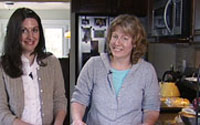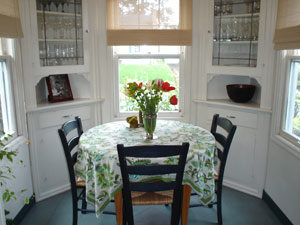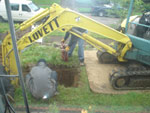Sustainable, yes, natural, no.

Home ownership is the great American Dream. To own the land (and the structures on the land) is pretty much the pinnacle of capitalist endeavor. For TwoJunes, our house is our savings, our retirement, a hobby, a joy, and occasionally, sheer terror. Admittedly, it is enormously gratifying to have control over your environment, the ability to make changes, to rip down, tear out, add on, embellish at will—to truly claim the space as your own without ever having to consult a landlord. But no one really warns you about the never-ending monotonous work required in housekeeping. Once you start thinking about it, you realize how utterly unnatural the endeavor is. “Keeping house” is very much actually what the word suggests: wresting the home back from the jaws of nature determined to reclaim it, trying desperately to preserve stasis in the face of an unrelenting assault. In a way, “housekeeping” is the opposite of gardening, where the lifecycle of seed to compost is honored. Nature wants to make your house compost.
Consider our particularly Oregonian war against the moss that attempts to turn the roof into greenspace, and the exhausting (and/or expensive) yearly effort to make sure the wooden decks and porch don’t rot. Water, elemental water, that is, has become our enemy. Watching the water shoot from the new overflow pipe in the “dry” well in middle of the yard is a rather frightening experience, but preferable to the backbreaking bailing of the great basement flood of the previous year. Keeping the elements out is not a simple matter of having walls, doors, and screens. In our old house, the drafty period windows necessitated sweaters year round, but were an actual blessing as it allowed the radon gas to escape! In our new house, the sweeps on the doors have self-destructed and the slight warping of a door away from its insulated edge allowed snow to drift onto our floor in the howling Gorge winds of last year. Sideways rain is determined to enter one poorly installed window. Without constant vigilance, the gutters become clogged with leaves and debris, allowing water to leak into our basement. Rain, which used to be soothing, is now a reason for earplugs at bedtime. Seriously, ear plugs.
All of these conveniences we rely upon for modern life are complex systems and machinery that require attention and care as well: septic and water lines will need replacing, the water pipes may contain lead, the oil tank needs decommissioning, the roof is on its last legs, and, hey, is that smell gas? The electricity goes off and then the pipes freeze and burst, the refrigerator fan dies on the hottest day of the year, faucets drip, wiring may catch fire, washers leak, the sump pump fails, smoke from the chimney backs up, the list goes on and on.
Then, there is the constant sweeping and vacuuming to keep the inside dirt, dust, fur and insect-free. The hypocrisy is that we really don’t want to share our closet with a large spider, but we are happy to see him in the garden. A slug in the garden is not great, but a slug traveling across the floor is not acceptable. Having made a home, we become an attractive target to termites, ants, squirrels and raccoons in the attic, to the army of rats that want to browse the compost bin. And that’s not even counting the constant wear and tear on the house from the dogs and cats—the animals that we’ve chosen to share our space!
If you are into sustainable agriculture, small farm meat, eco-friendly products, the assumption is that you want to work with nature. And that is true on many levels. But human “dwelling” is also an ongoing battle against slow, persistent forces of destruction, a battle we entered into long ago when humans moved from being hunter/gatherers to farming in settled communities, living in houses. It’s an interesting dynamic—how much and where do we listen and cooperate with nature and how much of what we hold dear in civilization is an outright war against nature. Thoughts?
Next week, TwoJunes make homemade ice cream and sorbet: it’s not hard, and once you start, you’ll never go back. The absence of processing and freezing aids, the gums and preservatives, makes a huge difference in flavor, texture and sweetness level—plus you get to use peak summer fruit!
Lisa Bell is a freelance producer, writer and editor. She spent the first fifteen years of her working life as a pastry chef, recipe developer, test kitchen director, food stylist and print editor. She has also taught cooking classes, run a small cooking school, and worked as a food scientist. Nicole Rees currently works as a baking scientist. She is also a food writer and cookbook author specializing in baking science. Her most recent book Baking Unplugged, is filled with simple, scratch recipes that require no electric gadgets beyond an oven.


